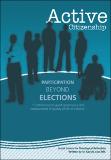Active Citizenship Participation Beyond Elections
Abstract
Zambia witnessed historic elections on 20 September 2011 in which the Patriotic Front (PF) emerged winners ousting the former ruling party the Movement for Multi Party Democracy MMD. The September elections, ended 20 years in power for the Movement for Multiparty Democracy, and were acclaimed by many as a rare example in Africa of a peaceful transition of political power to an
opposition party. Zambian’s had demonstrated their commitment to exercising their democratic right to vote. Prior to actual exercise of voting in 2011 elections, the JCTR provided platforms for citizens to discuss among others; the values that should determine one’s choice of a public office holder, what makes for free and fair elections, peaceful election environment etc. These platforms illustrated the keenness of most citizens to get involved and influence political change through an election. Recognizing that exercise of one’s democratic right does not end when the votes are tallied and the winners announced, JCTR saw the need to sustain the momentum and the political activity demonstrated during election by educating citizens on the concept of active citizenship beyond elections. Although voting is among the most important acts a citizen can engage in, there are other means to influence as a citizen. The Centre has sustained debates on governance issues beyond elections through public forums on Active Citizenship in different towns. The forums are aimed at encouraging public participation in political processes as well as any
issues of common concern. This booklet is a product of JCTR’s interaction with the public. It is intended to educate the public on the role of a citizen, by exploring different dimensions of citizenship. It also reminds different actors, such as the Church, Government, Political Parties and CSOs of their role in building Active Citizenship for democratic participation. The booklet will also serve as a resource for JCTR Outreach Teams, in their awareness raising on citizenship. As JCTR, we recognise the importance of building a strong democracy with active participation. We would therefore appreciate any thoughts on how best development can be realised through providing spaces for citizens’ engagement, beyond elections, in the governance of the country
Description
At the JCTR, we are clearly proponents of active citizenship but we by no means deceive ourselves that simply calling Zambians to speak out and come together to identify and find solutions to their problems, will necessarily address all the challenges confronting them. For active citizen to thrive, we need an environment and a culture that promotes it. There are certainly hurdles that exist that should be overcome but we have to start from somewhere and embrace a wide range of citizen behaviours from registering to vote, actually voting, participating in community affairs, lobbying representatives and officials. An active citizen is not necessarily a “good citizen” in the sense that they follow the rules. An active citizen may challenge the rules and existing structures provided they do so within the bounds of the democratic process and not become involved in violent acts
